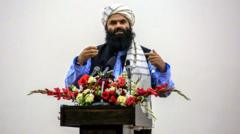The United States has withdrawn its bounties placed on key members of the Haqqani network, including Sirajuddin Haqqani, signaling a noteworthy shift in diplomatic dynamics with the Taliban.
US Lifts Bounties on Senior Taliban Figures Amid Shifting Diplomatic Ties

US Lifts Bounties on Senior Taliban Figures Amid Shifting Diplomatic Ties
The decision follows extensive negotiations between U.S. officials and the Taliban government aimed at fostering better relations.
The United States has recently removed bounties amounting to millions of dollars on prominent members of the Haqqani militant network in Afghanistan, which includes Sirajuddin Haqqani, the Taliban's interior minister. This development is significant, especially considering the Haqqani network's history of orchestrating some of the most notorious attacks in Afghanistan, including assaults on American and Indian embassies and NATO personnel. The network has been integral to the Taliban government's authority since foreign troop withdrawal in 2021, facilitated by a prior agreement between the US and the Taliban during President Trump's initial term.
The removal of these bounties follows a recent visit by US officials to Kabul to negotiate the release of an American tourist who had been detained since 2022. A spokesperson from the US state department confirmed to the BBC that there is now "no current reward" for Sirajuddin Haqqani, Abdul Aziz Haqqani, and Yahya Haqqani, although they remain classified as 'Specially Designated Global Terrorists' and the Haqqani network continues to be recognized as a Foreign Terrorist Organization. The FBI has updated its website, which once indicated a $10 million bounty on Sirajuddin Haqqani, to reflect this change.
Abdul Mateen Qani, a spokesman for the Taliban's interior ministry, claimed that the lifting of the bounties results from continuous diplomatic engagement. He described it as a positive step, reflecting a new approach to global interactions, particularly with the United States. This assessment came after a US delegation met with Taliban foreign minister Amir Khan Muttaqi and others in Kabul, following the release of George Glezmann, an American detained since December 2022.
Originally founded by Sirajuddin's father, Jalaluddin Haqqani, in the 1980s with CIA support, the Haqqani network has evolved into a major anti-Western entity in the region. Following the Taliban's initial power capture in 1996, the group became allies. Jalaluddin Haqqani passed away in 2018, leaving Sirajuddin to increasingly influence Afghanistan's political landscape as tensions rise with Taliban's supreme leader, Mullah Hibatullah Akhundzada. Internal disagreements, notably over women's education policies, highlight the diverging paths within Taliban leadership, with the Haqqani faction attempting to appear more moderate to gain public support in Afghanistan.
The US’s dropping of the bounties not only affects the Taliban's internal dynamics but also reflects a growing recognition from the international community of the Taliban’s potential role in Afghanistan’s future governance and regional stability.
The removal of these bounties follows a recent visit by US officials to Kabul to negotiate the release of an American tourist who had been detained since 2022. A spokesperson from the US state department confirmed to the BBC that there is now "no current reward" for Sirajuddin Haqqani, Abdul Aziz Haqqani, and Yahya Haqqani, although they remain classified as 'Specially Designated Global Terrorists' and the Haqqani network continues to be recognized as a Foreign Terrorist Organization. The FBI has updated its website, which once indicated a $10 million bounty on Sirajuddin Haqqani, to reflect this change.
Abdul Mateen Qani, a spokesman for the Taliban's interior ministry, claimed that the lifting of the bounties results from continuous diplomatic engagement. He described it as a positive step, reflecting a new approach to global interactions, particularly with the United States. This assessment came after a US delegation met with Taliban foreign minister Amir Khan Muttaqi and others in Kabul, following the release of George Glezmann, an American detained since December 2022.
Originally founded by Sirajuddin's father, Jalaluddin Haqqani, in the 1980s with CIA support, the Haqqani network has evolved into a major anti-Western entity in the region. Following the Taliban's initial power capture in 1996, the group became allies. Jalaluddin Haqqani passed away in 2018, leaving Sirajuddin to increasingly influence Afghanistan's political landscape as tensions rise with Taliban's supreme leader, Mullah Hibatullah Akhundzada. Internal disagreements, notably over women's education policies, highlight the diverging paths within Taliban leadership, with the Haqqani faction attempting to appear more moderate to gain public support in Afghanistan.
The US’s dropping of the bounties not only affects the Taliban's internal dynamics but also reflects a growing recognition from the international community of the Taliban’s potential role in Afghanistan’s future governance and regional stability.






















